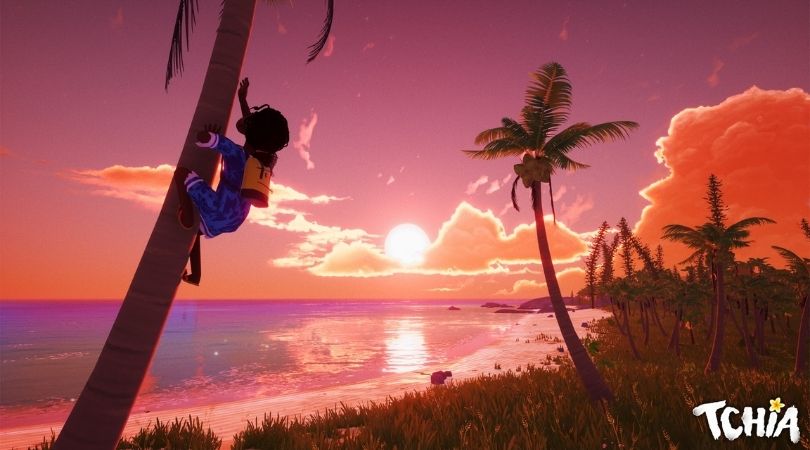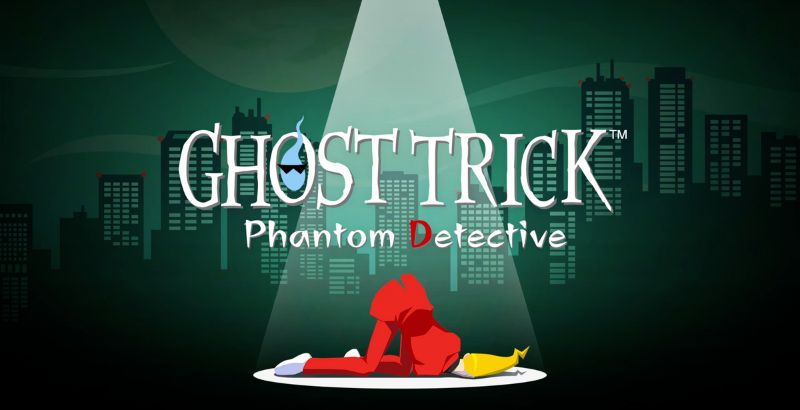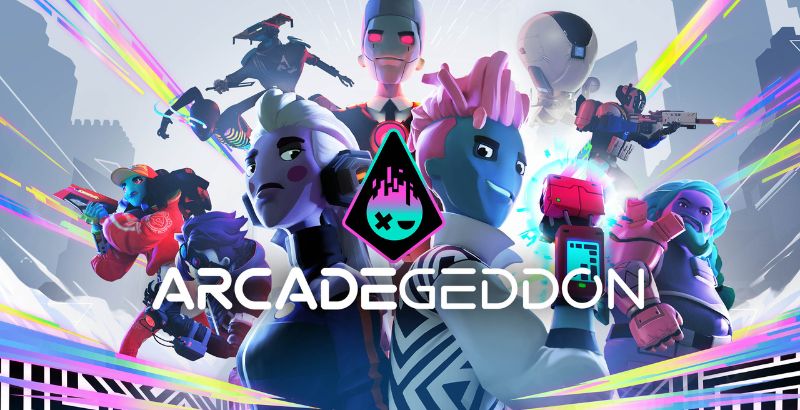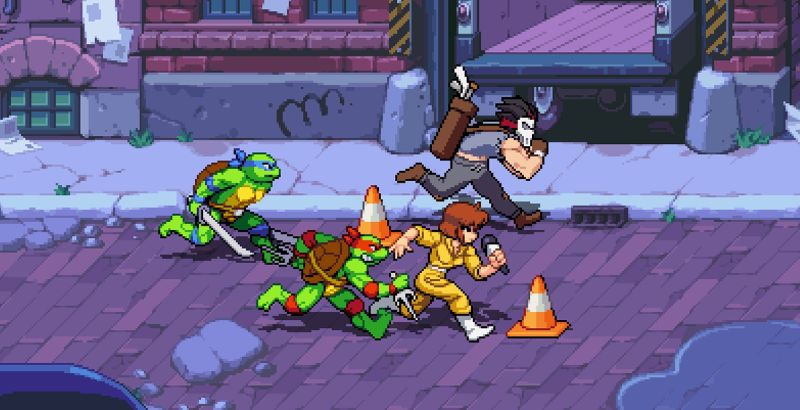
There are many games that try to base and celebrate a culture or land. However, few find a balance of showing off that culture, a taste of that culture’s home, and why it’s special to the creators who brought it to life. Tchia, by Awaceb and Kepler Interactive, did just that with the developers’ homeland of New Caledonia. A collection of island territories of France located in the Pacific, with its legends, music, cultures, and landscapes, are all that inspired the fictional islands and adventure in this coming-of-age adventure game. How does it play as a game? For a quick TLDR, Tchia is a can’t-miss that is brimming with charm in every facet of gameplay.
In Tchia, you play as a little girl named Tchia. Tchia lives with her father on a small island off the coast of Ija Nöj and Madra Nöj, all ruled by the malevolent god, Maevora. They live a peaceful, isolated life until one day, henchmen of Maevora appear, kidnapping her father. Tchia quickly learns while trying to save her father that she has a special latent gift. The ability to spirit jump into inanimate objects and animals. So Tchia sets sail to confront Maevora and save her father. While on her journey, she not only learns more about herself and her family but how other islanders find their own happiness under Maevora’s rule and how this evil gold is destroying nature for its own benefit. Slowly she builds friends and allies, gains blessings to put a stop to Maevora’s rule, and sets free more than she initially set out for.
At first, I thought Tchia was slow. The sailing is fun, but it’s hard to understand how fast you’re moving and navigating the world. It’s hard to have a sense at first of where you even are and how far you are from your destination. All you have is a map and a compass. Both of which don’t tell you where exactly you are in the world. You know where your goals are through pins or quest objective markers, but it’s really about the sense of exploration. About finding what is on your way to those waypoints. Like finding an odd woven collectible or a secret door that will help you later on. Or challenges like a race course for a Tchia-possessed animal. Or even a treasure map that will take you all across the islands to find special cosmetic collectibles.
It’s not just these challenges or collectibles that make exploring the islands fun; it’s how you can explore them. Spirit jumping is, I feel, a more fun version of the similar ability that was seen in Super Mario Odyssey and inspired by New Caledonian folklore of shape-shifting. Tchia is able to jump into any animal or inanimate object and control it. Yet, unlike Super Mario Odyssey, there is a limit that recharges over time when not in use. But it is so much fun to fly around the islands as a bird, swim the seas as a dolphin, and even just be a crab snipping at things.
Their controls are simple, but that works in their favor. It’s easy to fly around as a bird. It’s easy to start galloping around the islands as a deer. And when you line up, jumping from a bird to a gasoline can take out a camp of Maevora’s goons, you feel like this island is yours.
What adds to this feeling is Tchia’s ukulele-playing skills. By just playing four notes, Tchia can change the time of day, spawn a specific type of animal, be able to breathe underwater for a much linger longer time, and so much more. Think Ocarina of Time, but instead of an ocarina, you have a magical ukulele. By completing stone stacking challenges, Tchia gains more and more patterns that let you manipulate the world to your whims. Plus, every ability is on a short cooldown, so there is no real punishment for using them whenever you want.
This fantastic addition let me explore or collect items at my own pace. Plus, it really helped in the post-game when trying to complete every task, and instead of having to backtrack to a place that had a necessary item or animal needed for a challenge, I could just spawn my own. It’s all completely optional, and it never feels like it lessened my overall experience. Plus, every collectible was fun to find, and they all felt rewarding in a way. Every collectible box gave me new clothing items, new parts for Tchia’s raft, new ukulele options, and more. There is a SHOCKING amount of customization options! It’s not necessary to change Tchia’s looks; it doesn’t change anything for the gameplay. But it’s a fun addition nonetheless that let this feel like more of my own experience.
The standout of my time with Tchia was the story. All the twists and impactful moments really hit hard because I cared about Tchia and every single person she interacted with. They all felt like they had their own lives. Like they weren’t just placed on these islands but that this is their home. And I believed that they cared about their communities. There were several twists, too, that shocked me by just how dark they were. In a game that was about healing nature and bringing people together, Tchia‘s story tackles issues I never saw coming. All culminating in an ending that felt like a beautiful and touching bow on a heartbreaking and heartwarming package.

But what highlighted almost every story beat was an impactful interactive musical moment. Sung in French or the Drehu, languages native to New Caledonia. They’re rhythm games that can either be played in full or have the option to enjoy the cinematic playing out. They’re enjoyable reprieves that highlight more of this culture while also hammering home what exactly is happening. The songs chosen fit well with what’s going on in the story. Or even have songs change tone and rhythm to match the general emotion. I’m amazed about the thought and care that went into a mechanic that I felt was initially tacked on, and I looked forward to the next song after experiencing these moments a handful of times. I just wish I could replay certain songs whenever I wanted instead of having to replay a chapter to get to that moment again.
While I loved my time with Tchia, it wasn’t perfect. I first started playing the game on the PlayStation 5 version. After experiencing a game-breaking bug (which has since been fixed), I switched to the PS4 version. Both were patched during my playthrough. And during my journey, I had numerous crashes, a time I fell through the world, bad texture pop-in during end-game cinematics, and found objects that felt like they didn’t work as intended (I’m looking at you, crane game). Since beating the game and cleaning up collectibles on the latest version of the game, Tchia does feel more stable. But be warned that the late-game moments felt more unstable than the rest of what came before.
Regardless of the bugs I experienced, Tchia was a grand adventure that I couldn’t put down. Exploring these islands renewed my love of deep and well-realized open-world exploration games, all thanks to Soul-Jumping. Exploring the numerous land, sky, and sea creatures made what could be a long hike a joyous adventure. Plus, with numerous challenges, collectibles, and games to play, I didn’t want to stop playing even after reaching the credits. Even the occasional rhythm game segments were surprisingly fun additions that set the tone for every major story moment. All highlighting culture in a package you can tell was made with all the love, reverence, and appreciation by the developers for their home. Tchia isn’t for everyone. But for those who give it the time, you’ll find one of the most heartfelt stories told in one of the most beautiful locations made for a video game.
Tchia is available on March 21st on PlayStation 5, PlayStation 4, and PC.
Tchia
-
Rating - 8/108/10
TL;DR
Tchia was a grand adventure that I couldn’t put down. Exploring these islands renewed my love of deep and well-realized open-world exploration games, all thanks to Soul-Jumping. Exploring the numerous land, sky, and sea creatures made what could be a long hike a joyous adventure.






